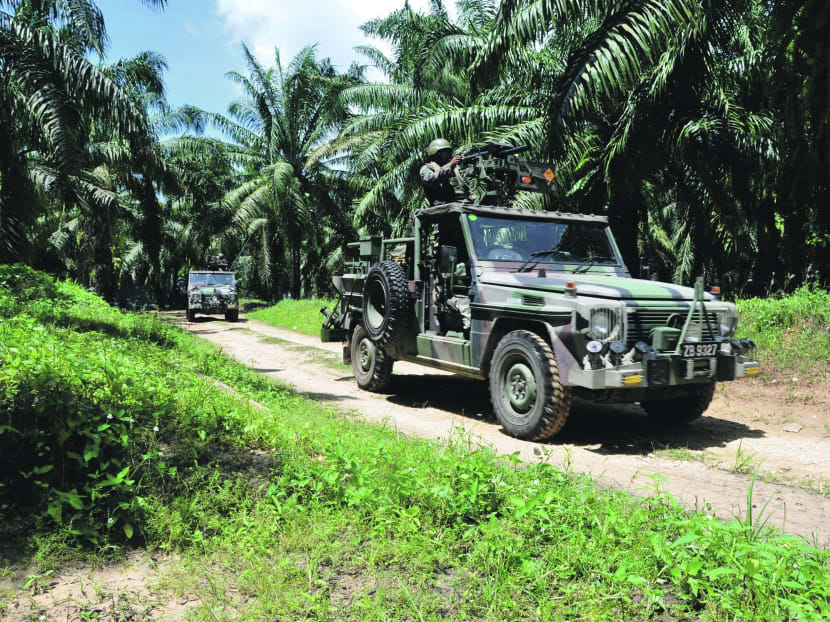Conflict in Sabah a ‘boost for BN’
KOTA KINABALU — As Malaysian troops continue to root out the remnants of a group from the southern Philippines that landed in Sabah last month and staged an invasion of sorts, there has been an unexpected side effect from the incident: A boost for the ruling Barisan Nasional (BN).

Malaysian soldiers patrolling a village in Lahad Datu, Sabah, where a stand-off with Filipino gunmen took place. Photo: AP
KOTA KINABALU — As Malaysian troops continue to root out the remnants of a group from the southern Philippines that landed in Sabah last month and staged an invasion of sorts, there has been an unexpected side effect from the incident: A boost for the ruling Barisan Nasional (BN).
The group of about 250 from the self-styled Sulu Sultanate landed in the town of Lahad Datu and set up camp there for weeks before the Malaysian armed forces moved in and acted forcefully to end the incursion. So far, 63 of the group have been killed, along with eight Malaysian policemen and two soldiers.
While the intrusion reignited fears among Sabahans over security in the state, a flush of patriotism has bloomed across the rest of the country, as Malaysians rallied around the armed forces and police and grieved at the sight of flag-draped coffins of those who paid the ultimate price while defending their nation.
Associate Professor Sivamurugan Pandian of University of Science, Malaysia in Penang is among several who view the events of the last few weeks as a boost for the Najib administration.
The opposition’s missteps did not help, he said. “Comments made by opposition figure Tian Chua of the PKR (Parti Keadilan Rakyat) that the Sulu invasion was an UMNO sandiwara (drama) did not go down well. The lives of Malaysians were lost in trying to beat off the invaders, and this awakened a nationalistic spirit in many Malaysians.”
The political scientist added: “Those want to vote opposition will vote opposition anyway, but there will be fence-sitters who will be swayed to vote for Najib’s BN, given that he issued the orders to protect the country’s sovereign rights. I am sure BN will use this during the election campaign and say that the opposition does not take the security of the country seriously.”
That sentiment bodes well for the ruling coalition, which has long viewed Sabah as a “fixed deposit” state when it comes to elections. In the 2008 general election, for instance, the BN had its strongest performance here, recording a near clean sweep in contests for 25 parliamentary seats and 60 state assembly seats.
Observers had questioned whether there will be a repeat performance in the coming 13th general election, which is expected to be called within weeks, given widespread anti-BN sentiment in the wake of the 2008 polls. The BN component parties that will contest here — the United Malays National Organisation (UMNO) and the Parti Bersatu Sabah — are brimming with confidence, nevertheless.
Assoc Prof Pandian agrees they have reason to be confident. “Sabah stayed largely intact after the 2008 political tsunami which hit peninsular Malaysia. Even neighbouring Sarawak saw some changes, but not Sabah.”
He added: “I don’t see the BN government losing control of the state in the coming election. Maybe the urban seats will see some changes, but there are not that many urban seats in Sabah.”
What of the opposition Democratic Action Party (DAP), which spoiled the BN’s perfect record by winning one parliamentary seat and one state seat in the last election? Assoc Prof Pandian is dismissive of its chances, and points out that while Chinese voters in peninsular Malaysia have deserted BN’s Malaysian Chinese Association (MCA) in droves and flocked to the DAP, Sabah’s Chinese voters are different.
“The Chinese voters here are quite a different lot compared to their West Malaysian counterparts. Even if they want to vote opposition, they would rather identify themselves with a local instead of a West Malaysia-based candidate or party,” he said.
Another plus point for BN in Sabah is the reservoir of goodwill many have for UMNO, led here by Chief Minister Musa Aman. The party’s record of providing economic growth and business opportunities resonates with many.
The opposition, though, is pressing the attack. It continues to hammer home its questions about illegal migrants to Sabah, which some quarters have numbered as high as two million.
The opposition claims that many of these illegal migrants have received voting rights, and this has changed voter demographics in the state. Calls for equal opportunities for non-Muslim bumiputeras of Sabah — such as the Kadazans, Muruts and Rungus — have also struck a chord.
The general consensus among observers, however, is that the firepower which Mr Najib deployed to quell the invasion has also torpedoed the hopes of the opposition in Sabah. Dr Arnold Puyok, a political analyst based in Kota Kinabalu, summed up the mood of many in an interview with The Malaysian Insider last week, in which he said: “That’s what the people of Sabah wanted from the very beginning.”






